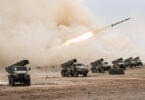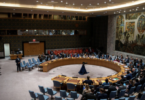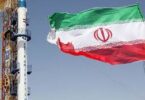F.P. Report
ISLAMABAD: Foreign Minister Shah Mehmood Qureshi, who is in Saudi Arabia on a Middle East peace mission, called on his counterpart Prince Faisal bin Farhan on Monday and cautioned that the tensions between Iran and United States could hit the already fragile reconciliation process in Afghanistan.
In December 2018, Pakistan brokered rare direct talks between Washington and the Afghan Taliban, paving the way for a negotiated settlement of the decades-old conflict.
The process, however, is still awaiting a breakthrough, as the Taliban have turned down repeated calls for inclusion of the Kabul government in the talks.
FM Qureshi arrived in Riyadh earlier in the day after completing his visit to Iran, as part of Pakistan’s efforts to help defuse tensions following the assassination of top Iranian commander in US drone strike in Baghdad and, subsequent missiles attack on US bases in Iraq.
He was received at King Khalid International Airport by Deputy Minister for Protocol Affairs of Saudi Ministry of Foreign Affairs Azzam Al Qain, Pakistan ambassador to Saudi Arabia Raja Ali Ijaz and senior officials of the embassy.
According to the official statement, the foreign minister met his Saudi counterpart at the Saudi Ministry of Foreign Affairs in Jeddah.
Discussing the prevailing situation, Qureshi urged that the diplomatic means should be used to deescalate the situation in the region and resolve matters peacefully.
The Saudi foreign minister appreciated the initiative taken by Prime Minster Imran Khan to defuse the tensions in the Middle East. He also welcomed the recent trip of FM Qureshi.
Meeting Iranian leadership
On Sunday, the foreign minister met President Hassan Rouhani and urged him to use diplomatic means to dial down tensions in the region and resolve matters amicably.
During his meeting with President Rouhani that encompassed the US-Iran tension, regional peace and the multifaceted Pak-Iran ties, the foreign minister said both the countries enjoyed deep historic, religious, and cultural brotherhood.
Qureshi thanked the Iranian Supreme Leader Ayatollah Ali Khamenei and the Iranian president on behalf of Prime Minister Imran Khan for raising their voice against Indian atrocities in Occupied Kashmir and supporting Pakistan’s stand.
The foreign minister had kicked off his diplomatic mission on the directives of Premier Imran to discuss peace and share Pakistan’s perspective on Middle East tensions.
The visit comes in the wake recent developments which have seriously risked peace and security in an already volatile region and requires immediate and collective efforts for a peaceful resolution.
US forces killed Iran’s most revered military commander Maj Gen Qassem Suleimani in a drone strike near Baghdad airport on Jan 3, while in revenge Tehran attacked two US military bases in Iraq with missiles five days later. Though the two countries have apparently stood down, tension is still running high in the region.
US officials frequently contacted Pakistani military brass during the crisis, but Islamabad made it abundantly clear that it would not become party to any armed conflict in the region and instead advised all to exercise maximum restraint to avoid war.






